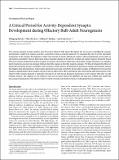A critical period for activity-dependent synaptic development during olfactory bulb adult neurogenesis
Author(s)
Kelsch, Wolfgang; Lin, Chia-Wei; Mosley, Colleen P.; Lois, Carlos
DownloadKelsch-2009-A critical period fo.pdf (898.8Kb)
PUBLISHER_POLICY
Publisher Policy
Article is made available in accordance with the publisher's policy and may be subject to US copyright law. Please refer to the publisher's site for terms of use.
Terms of use
Metadata
Show full item recordAbstract
New neurons integrate in large numbers into the mature olfactory bulb circuit throughout life. The factors controlling the synaptic development of adult-born neurons and their connectivity remain essentially unknown. We examined the role of activity-dependent mechanisms in the synaptic development of adult-born neurons by genetic labeling of synapses while manipulating sensory input or cell-intrinsic excitability. Sensory deprivation induced marked changes in the density of input and output synapses during the period when new neurons develop most of their synapses. In contrast, when sensory deprivation started after synaptic formation was complete, input synapses increased in one domain without detectable changes in the other dendritic domains. We then investigated the effects of genetically raising the intrinsic excitability of new neurons on their synaptic development by delivering a voltage-gated sodium channel that triggers long depolarizations. Surprisingly, genetically increasing excitability did not affect synaptic development but rescued the changes in glutamatergic input synapses caused by sensory deprivation. These experiments show that, during adult neurogenesis in the olfactory bulb, synaptic plasticity is primarily restricted to an early period during the maturation of new neurons when they are still forming synapses. The addition of cells endowed with such an initial short-lived flexibility and long-term stability may enable the processing of information by the olfactory bulb to be both versatile and reliable in the face of changing behavioral demands.
Date issued
2009-09Department
Massachusetts Institute of Technology. Department of Biology; Massachusetts Institute of Technology. Department of Brain and Cognitive Sciences; Picower Institute for Learning and MemoryJournal
Journal of Neuroscience
Publisher
Society for Neuroscience
Citation
Kelsch, Wolfgang et al. “A Critical Period for Activity-Dependent Synaptic Development during Olfactory Bulb Adult Neurogenesis.” J. Neurosci. 29.38 (2009): 11852-11858. © 2009 The Society for Neuroscience
Version: Final published version
ISSN
1529-2401